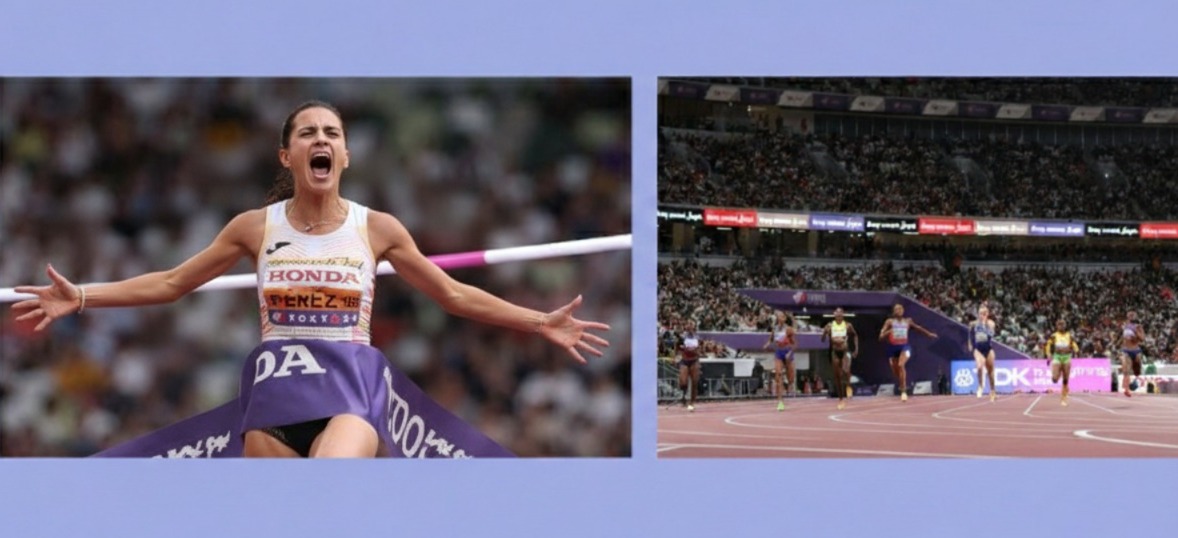Day Seven Round Up World Athletics Championships Tokyo 2025
Evaluation by Dr. C. Ajithkumar, International Athletics Coach
Melissa Jefferson Wooden Sprint Double 100m and 200m
Jefferson Wooden's ability to produce two world leading personal bests within five days is a textbook example of how sprinters can balance speed endurance and recovery. Her 21.68 in the 200m shows not only raw speed but also strong curve running technique and controlled transition into the straight. The fact that she could pull away from Shericka Jackson in the final 50m reflects perfect speed reserve and strength endurance conditioning.
Coaching Note: Young sprinters should study how she distributes energy phases reaction, drive, transition, maximum velocity, maintenance without major deceleration.
Femke Bol Retaining 400m Hurdles Gold
Bol's 51.54 WL is technically her most efficient major championship race. She ran with a balanced stride pattern, clean clearance, and maintained momentum through the final 100m the critical phase where many hurdlers fade. Her ability to run a controlled rhythm without overstriding demonstrates mastery of stride economy and hurdle cadence.
Coaching Note: For upcoming hurdlers, rhythm training with variable stride patterns and fatigue simulation workouts last 150m under lactate build up is essential.
Pedro Pichardo Triple Jump Precision
Winning with his last attempt 17.91m WL is a mental and technical lesson. Triple jump requires rhythm, hop step jump control, and take off accuracy under pressure. Pichardo's ability to respond to Dallavalle's PB with composure shows his psychological resilience and confidence in jump mechanics.
Coaching Note: Athletes must train not only physical execution but also competition mindset drills to deliver when it matters most.
Noah Lyles Fourth 200m World Title
His 19.52 win in a race where five athletes ran sub 19.80 proves the depth of modern sprinting. Lyles is a master of curve running mechanics, maintaining posture, relaxation, and arm drive while conserving energy for the last 60m. The ability to handle pressure from Bednarek, Tebogo, and Levell shows his tactical execution and confidence in his peak form.
Coaching Note: Sprint specialists must study how Lyles maintains relaxed speed under maximal effort a hallmark of world class sprinting.
Rai Benjamin 400m Hurdles Gold
Benjamin's 46.52 is a combination of power, rhythm, and resilience, even after clipping the last hurdle. This shows how elite athletes maintain technical efficiency even under fatigue and error conditions. His stride rhythm remained stable, proving that rehearsed consistency in practice prepares athletes for race day imperfections.
Coaching Note: Hurdlers must develop error recovery drills where they intentionally practice after hurdle contact to ensure rhythm remains unbroken.
Heptathlon Anna Hall Leads
Hall's performance highlights how multi event athletes must balance explosive power, speed endurance, and technical skills across disciplines. Her PB in the shot put 15.80m shows her progressive improvement in weaker events, a critical step for overall heptathlon success. With Thiam and Johnson Thompson still in contention, this event is a showcase of all round athletic mastery.
Coaching Note: Young heptathletes must learn the importance of event balance consistent improvement in weaker areas while preserving strengths is the only way to stay on the global podium.
Day Seven Key Evaluation Points
- Peak performance timing: Champions peak at the right time, not all the time.
- Technical precision under fatigue: Maintaining form under pressure separates winners from the rest.
- Psychological resilience: Delivering in decisive moments is as important as physical training.
Day Seven in Tokyo highlighted the value of structured preparation, technical mastery, and mental conditioning showing that behind every medal lies years of disciplined training and coaching excellence.





